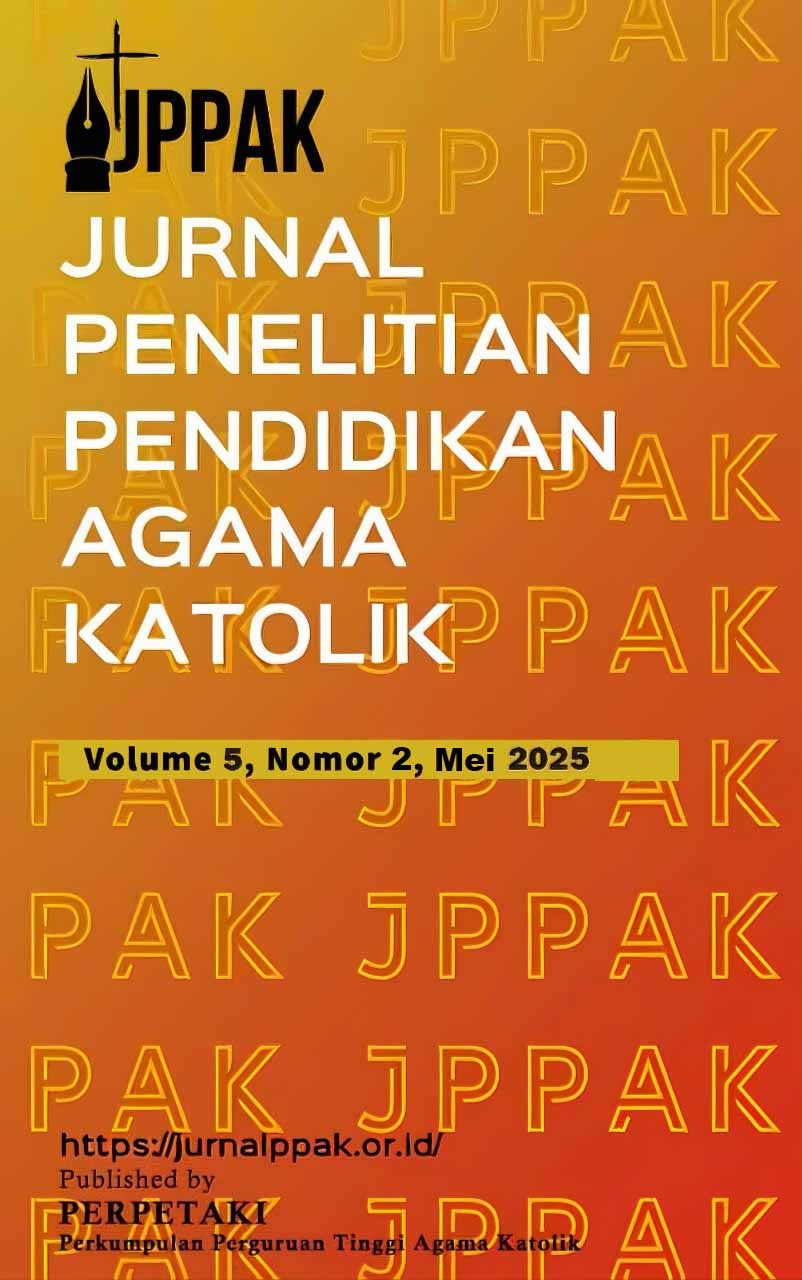Katekis dan Pastoral Kehadiran: Menjawab Tantangan Zaman melalui Pembinaan Nilai-Nilai Keutamaan Kristiani
DOI:
https://doi.org/10.52110/jppak.v5i2.227Keywords:
Katekis, Keutamaan Kristiani, Pastoral Kehadiran, UmatAbstract
The role of catechists in the Catholic Church is very important in helping people understand and live Christian teachings through pastoral presence, namely a real presence that builds faith, hope, and love among the people. Catechists are not only teachers, but also spiritual companions who support the daily lives of the people. This study aims to explore the role of catechists in building Christian virtue values while identifying the challenges and opportunities they face in implementing pastoral presence. Through a descriptive qualitative method with a literature study approach, the researcher attempted to analyze literature sources such as books, scientific articles, Church documents and related academic literature. The results of the study show that catechists play an important role in strengthening the faith of the people through teaching, spiritual accompaniment, and strengthening sacramental life, as well as being bearers of hope amidst the various challenges of people's lives. In addition, through pastoral presence, they motivate people to realize love in real actions, such as social service and community solidarity. However, this study also revealed a number of challenges, such as limited training, a shortage of catechists in remote areas, and the influence of modernity that encourages secularization and individualism. The findings show the need for innovation in the pastoral approach, by being present among the people to answer the increasingly diverse needs of the people. This study concludes that the pastoral presence of catechists is a real manifestation of the Church's shepherding and the embodiment of Christ's love among the people. These findings are expected to provide insight into the development of catechist formation programs and more effective pastoral service strategies so that the Church remains relevant in facing changing times and modern challenges, while strengthening the values of Christian virtue among Catholics.
Downloads
##submission.downloads##
Submitted
Accepted
Published
How to Cite
Issue
Section
License
Copyright (c) 2025 Marianus Rago Kristeno, Angelina Febrianty Mukin, Karolina Suwul, Teresia Noiman Derung

This work is licensed under a Creative Commons Attribution-ShareAlike 4.0 International License.
Copyright Notice and Permissions
Jurnal Penelitian Pendidikan Agama Katolik offers immediate open access to all its content on the principle to make researches freely available to the public, especially to the scholars, to support greater global exchanges of knowledge. This journal encourages all scholarly authors to allow their research openly available, free access and without time restrictions.
All articles published Open Access will be immediately and permanently free for everyone to read and download. Under the CC BY-SA 4.0 license, authors retain ownership of the copyright for their article, however authors grant others permission to use the content of publications in Jurnal Penelitian Pendidikan Agama Katolik (JPPAK) in whole or in part provided that the original work is properly cited. Users (redistributors) of Jurnal Penelitian Pendidikan Agama Katolik (JPPAK) are required to cite the original source by including at least: the full title of the article, the author's or authors' full name(s), JPPAK as the initial source of publication, year of publication and volume number using a propriate citing method.
Copyright encompasses exclusive rights to reproduce and deliver the article in all form and media, including reprints, photographs, microfilms and any other similar reproductions, as well as translations. The reproduction of any part of this journal, its storage in databases and its transmission by any form or media, such as electronic, electrostatic and mechanical copies, photocopies, recordings, magnetic media is prohibited without consent of Jurnal Penelitian Pendidikan Agama Katolik (JPPAK).
Jurnal Penelitian Pendidikan Agama Katolik (JPPAK) is licensed under a Creative Commons Attribution Share-Alike 4.0 International. (CC BY-SA 4.0)
Authors who publish with Jurnal Penelitian Pendidikan Agama Katolik (JPPAK) agree to the following terms:
- Authors retain copyright and grant the journal right of first publication with the work simultaneously licensed under a Creative Commons Attribution Share-Alike 4.0 International (CC BY-SA 4.0) license that allows others to share the work with an acknowledgement of the work's authorship and initial publication in this journal.
- Authors are able to enter into separate, additional contractual arrangements for the non-exclusive distribution of the journal's published version of the work (e.g., post it to an institutional repository or publish it in a book), with an acknowledgement of its initial publication in this journal.
- Authors are permitted and encouraged to post their work online (e.g., in institutional repositories or on their website) after the publication on JPPAK, as long as it not published on other OJS for it will be treated as plagiarism by plagiarism checker apps. It can lead to productive exchanges, as well as earlier and greater citation of published work (See The Effect of Open Access).












